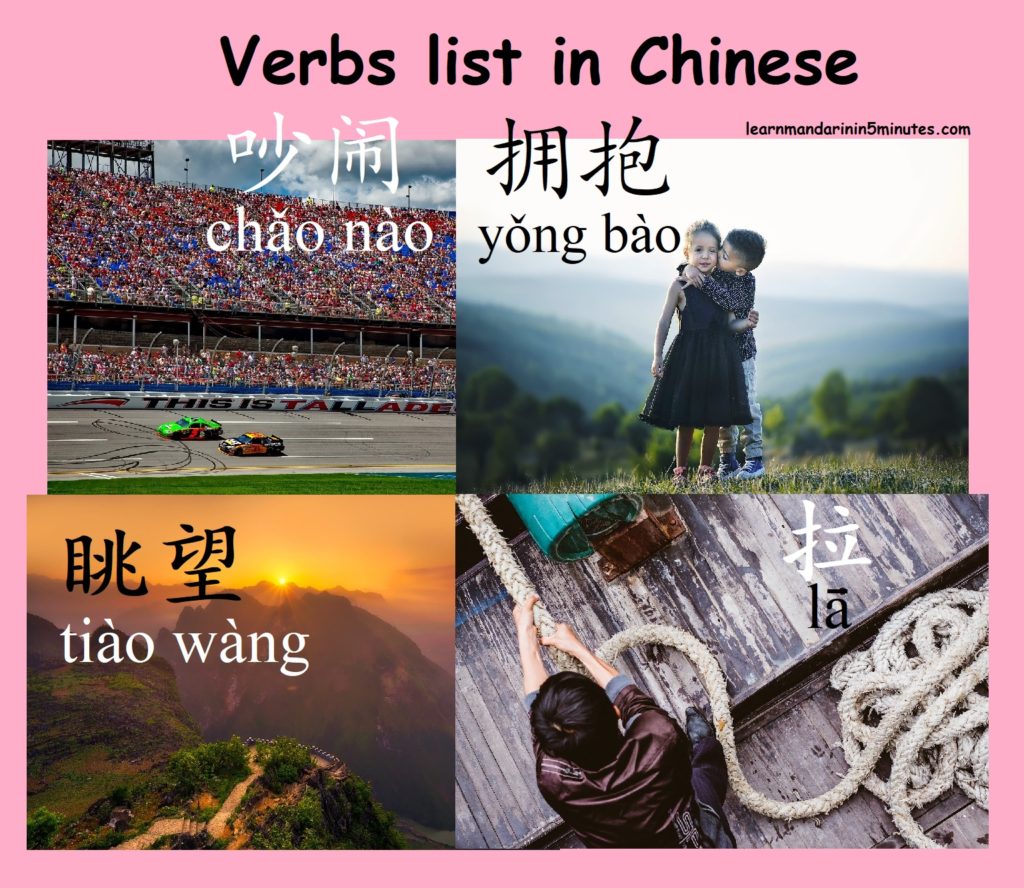Just like learning English or any other foreign languages, we need to learn verbs in order to describe an action, a behavior, feelings etc. Learning Chinese is no different. BUT, learning Chinese is easier because verbs in Chinese do not have tenses. Verbs in Chinese remain the same whether you are saying something in the past, present or future. Phew! ^^.
In Chinese, when saying something in the past or future, all you need to do is to add a time phrase, and you are on your way to speaking good Chinese.
Verbs examples
Action verbs
Action verbs in Chinese are verbs like 吃chī (eat), 喝hē (drink), 看kàn (see)读dú (read)
Behavior verbs
Behavior verbs in Chinese are 学习 xué xí (learn), 讨论 tǎo lùn(discuss),研究 yán jiū (research), 解决 jiě jué (provide solution)
Verbs describing changes
Verbs examples for this category are 发展 fā zhǎn (develop), 消失xiāo shī (disappear), 增加 zēng jiā (increase), 破产 pò chǎn (bankrupt)
Psychological verbs
These are verbs in Chinese like 爱 ài (love), 恨 hèn (hate), 喜欢 xǐ huān (like), 吃醋 chī cù (jealousy), 怕 pà (afraid)
Verbs describing the beginning and end
Chinese verbs like 开始 kāi shǐ (start), 结束 jié shù (end), 继续 jì xù (continue), 进行 jìn xíng (in progress) are verbs examples under this category.
Directional verbs
Directional verbs in Chinese are verbs that describes directions like 来lái (come), 上 shàng(up), 下 xià (down), 进 jìn (in), 出 chū (out)
Special verbs
是 shì(to be), 有 yǒu (to have), 像 xiàng (look like) are considered as special verbs in Chinese.
Verb list for action verbs
In this post, we will learn action verbs that relate to parts of our body such as 眼睛 yǎn jīng (eyes), 嘴 zuǐ (mouth), 手 shǒu (hands), 身体 shēn tǐ (body), 脚 jiǎo (legs) etc.

Verb list relating to the Eyes
看 kàn – to see
查看 chá kàn – to check
观看 guān kàn – to watch
睁眼 bì yǎn – to open the eyes
闭眼 bì yǎn – to shut the eyes
瞥一眼 piē yī yǎn – to glance at
偷看 tōu kàn – to peep
眺望 tiào wàng – overlook
Verb lists relating to the mouth
叫喊 jiào hǎn – to shout
呕吐 ǒu tù – to vomit
呼吸 hū xī – to breathe
喧哗 xuān huá – to make a racket
笑 xiào – to laugh
哭 kū – to cry
询问 xún wèn – to enquire
谈话 tán huà – to talk /chat
吵架 chǎo jià – to quarrel
吵闹 chǎo nào – noisy
唱歌 chàng gē – to sing
Verbs list relating to the hand
丢掉 diū diào – to throw away
抓 zhuā – to catch
抚摸 fǔ mō – to pet / to gently caress or stroke
拾 shí – to pickup
捡 jiǎn – to pickup
推 tuī – to push
揉 róu – to knead / to massage / to rub
拉 lā – to pull
握 wò – to shake hands / to hold / grip
拌 bàn – to mix
抽打 chōu da – to whip
Verbs list relating to the body
躺 tǎng – to lie down
运动 yùn dòng – to exercise
拥抱 yǒng bào – to hug
滚 gǔn – to roll
起来 qǐ lái – to get up
移动 yí dòng – to move
Verbs list relating to the leg
跑 pǎo – to run
跳 tiào – to jump
踢 tī – to kick
跺脚 duò jiǎo – to stamp feet
走 zǒu – to walk
站 zhàn – to stand
踩踏 cǎi tà – to trample on
Love to hear from you!Feel free to comment on this post for us to know whether we have helped you to better understand the Chinese language. If you like to support us, please subscribe to our youtube channel.
